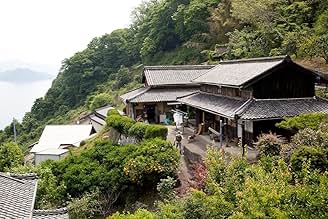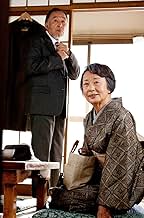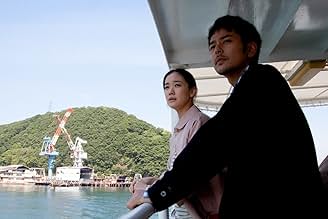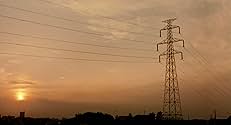Tôkyô kazoku
- 2013
- 2h 26m
ÉVALUATION IMDb
7,5/10
2,3 k
MA NOTE
Ajouter une intrigue dans votre langueIn this update of Yasujiro Ozu's "Tokyo Story", a retired schoolteacher and his wife visit their three working children in modern-day Tokyo.In this update of Yasujiro Ozu's "Tokyo Story", a retired schoolteacher and his wife visit their three working children in modern-day Tokyo.In this update of Yasujiro Ozu's "Tokyo Story", a retired schoolteacher and his wife visit their three working children in modern-day Tokyo.
- Director
- Writers
- Stars
- Prix
- 2 victoires et 16 nominations au total
Avis en vedette
I was anticipating a respectful homage to Ozu's Tokyo Story. What I got was respectful but a very different take on Ozu's classic. Watching the first half was a little worrying as the movie took its time establishing the characters and setting the scene, with the obligatory nods to Ozu's super low camera angles. Had Yoji Yamada lost his way while eulogizing his hero? But this start made the second half really shine as you really knew the characters, and became involved in their actions since we understood their faults, and wondered if, or when, they were ever going to develop and change. Fans of Yamada will again delight in his subtle depictions of contemporary Japan. He has long championed the innate goodness of ordinary people living in suburbs and villages away from the tourist-trampled extremes of Shinjuku, Ginza or Gion. Although his characters are imperfect, they exemplify Yamada's profound respect for the institutions of family and friendship. Additionally, Im not sure if this was a deliberate subplot or not but, students of Japanese gender-based communication style differences will find a minefield of scenes to use for generating discussion. Highly recommended for those who also believe in Yamada's values.
9/10
watched an amazing film this morning just when i was trying to get to sleep after another "up till sunrise" night it's called Tokyo Family by Yôji Yamada, a tribute to legendary Japanese director Yasujirô Ozu and his most famous film, Tokyo Story from 1953 it's quite similar in idea, where older parents from a country sea side town come to Tokyo to visit their kids / grand kids, but no one really has time for them Tokyo has this high paced way of living, while in the country the old folks just kick back and enjoy life go by
the relationship between the father and son reminded me of my situation with dad who recently passed away - my personality & outlook in life is like mine while the fathers is like my dad also there's a death in the film where the whole family has to go thru, very sudden like dad's circumstances
it destroyed me, but in a good way cause it allowed be to grieve a bit more, cause I've been resisting it a bit since dad's funeral it really is a heart breaking film, and like death it is hard for all family members to endure in the film the funeral & wake were very beautiful, respectful all the family got together like we all did it finishes on a positive note that life must go on, the father becomes more accepting of the son & vice versa thru this death in the family they break their stand off between each other and bond in their own unique way
instant 9/10 & keen to watch it again u should too, to see the contrasts between generations, traditions & cities old times compared to modern times something that will be timeless, just like Yamada modernising the Ozu 50s masterpiece with another masterpiece that will be also treasured for generations to come
watched an amazing film this morning just when i was trying to get to sleep after another "up till sunrise" night it's called Tokyo Family by Yôji Yamada, a tribute to legendary Japanese director Yasujirô Ozu and his most famous film, Tokyo Story from 1953 it's quite similar in idea, where older parents from a country sea side town come to Tokyo to visit their kids / grand kids, but no one really has time for them Tokyo has this high paced way of living, while in the country the old folks just kick back and enjoy life go by
the relationship between the father and son reminded me of my situation with dad who recently passed away - my personality & outlook in life is like mine while the fathers is like my dad also there's a death in the film where the whole family has to go thru, very sudden like dad's circumstances
it destroyed me, but in a good way cause it allowed be to grieve a bit more, cause I've been resisting it a bit since dad's funeral it really is a heart breaking film, and like death it is hard for all family members to endure in the film the funeral & wake were very beautiful, respectful all the family got together like we all did it finishes on a positive note that life must go on, the father becomes more accepting of the son & vice versa thru this death in the family they break their stand off between each other and bond in their own unique way
instant 9/10 & keen to watch it again u should too, to see the contrasts between generations, traditions & cities old times compared to modern times something that will be timeless, just like Yamada modernising the Ozu 50s masterpiece with another masterpiece that will be also treasured for generations to come
This film is a 2013 color re-make of Yasujiro Ozu's 1953 "Tokyo Story," that was voted the #1 film by directors in the 2012 Sight and Sound poll. The plot lines and characters are very similar with some distinct differences; even some lines of dialogue are the same or very similar. The biggest difference is that while Noriko in the 1953 film is the daughter-in-law of the elderly couple, whose son was killed in WWII, Noriko in the 2013 film is the future daughter-in-law engaged to the elderly second couple's son (much more developed in this film, not in a flattering way). In addition, the incomparable Setsuko Hara, known as the Japanese Garbo, played Noriko in the 1953 film and brought to the role a transcendent luminosity of compassion and wisdom. Secondly, while Ozu had a distinct cinematographic style of usually having the camera directly in front of the characters while they spoke, we see this much less frequently in the 2013 film. These are just a few of the differences. Overall, it is an interesting re-make, but Ozu's "Tokyo Story" is still one of the greatest films ever made.
A remake of Yasujiro Ozu's Tokyo Story (1953), which is widely regarded as one of the finest films ever made. Director Yoji Yamada follows the plot of the earlier film closely (though he doesn't borrow Ozu's stylistic touches; thus, this is necessarily a more conventional movie).
There are also changes in some of the characters. The youngest children, Kyoko and Keizo, do not exist in this version. Noriko here is not the widowed wife of their fallen son in the war, but the girlfriend of their son Shoji (who is alive here, and works as a theater decorator). Noriko is played by Yu Aoi, who is pretty and charming, though she lacks the screen charisma Setsuko Hara has in the original version (she is given less screen time, also). Also, I notice that in this version the elder children and the grandchildren are less rude to the elder couple. For instance, the eldest daughter Shige, as played as Tomoko Nakajima, is not as mean and bitchy as Haruko Sugimura was in the original. And the grandfather Shukichi, is less nice here than in the original version. He openly questions his children, especially Shoji, which in the original only did obliquely.
Obviously, this film is not up to the level of the original, but it is a well made, pleasant movie to watch.
There are also changes in some of the characters. The youngest children, Kyoko and Keizo, do not exist in this version. Noriko here is not the widowed wife of their fallen son in the war, but the girlfriend of their son Shoji (who is alive here, and works as a theater decorator). Noriko is played by Yu Aoi, who is pretty and charming, though she lacks the screen charisma Setsuko Hara has in the original version (she is given less screen time, also). Also, I notice that in this version the elder children and the grandchildren are less rude to the elder couple. For instance, the eldest daughter Shige, as played as Tomoko Nakajima, is not as mean and bitchy as Haruko Sugimura was in the original. And the grandfather Shukichi, is less nice here than in the original version. He openly questions his children, especially Shoji, which in the original only did obliquely.
Obviously, this film is not up to the level of the original, but it is a well made, pleasant movie to watch.
Cinephiles will tell you about the greatness of Tokyo Story, a 1953 Japanese film directed by Yasujiro Ozu. The story about an aging couple who travel to Tokyo to visit their grown children, only to have them being too busy to pay them much attention, is regarded as one of the most poignant tales ever told on screen. And as with every remarkable piece of work, there is a need to introduce it to a wider audience, hence the contemporary filmmakers' decision to produce Tokyo Family, an interpretation which you can either define as a remake, a tribute or an update.
Yoji Yamada (The Twilight Samurai, The Hidden Blade) takes on this story and gives it a relatable angle to today's viewers. The plot is identical to the classic: An old couple from an isolated part of Japan takes the train to Tokyo to spend time with their grown children, not expecting them to be too occupied and indifferent to host them. A tragic death reunites the family in a quiet country town and has them coming to terms with how they have drifted apart because of selfishness.
Made 60 years after the premiere of Tokyo Story and celebrating the 50th anniversary of the respected Ozu's death, this 146 minute film serves as a kind reminder of the importance of family ties. This is especially current in today's society, considering how new media and social expectations have changed how family members interact with each other.
With that said, Yamada's latest work does not seem to offer anything refreshing. That is nothing surprising though, considering how Yamada was an assistant director of the earlier film. The 1954 graduate of Tokyo University painstakingly attempts to replicate the style of the original, from its slow pacing to how important events are revealed in dialogue instead of being shown on screen.
Those who have watched the original (a large group would probably be film students) may find this version uninspiring, and the younger ones may find their patience being tested with the unhurried storytelling. However, do not let this make you feel that this is an unimportant piece of work. There are still pertinent themes which we as children ought to understand in this evergreen tale. There are times you know how things should work, but nothing works better than a screen visualisation to remind you of how things should be.
There is strong acting from the cast here – Isao Hashizume and Kazuko Yoshiyuki shine in their roles as the unassuming parents who travel to bustling Tokyo from their quiet home on a small island, Masahiko Nishimura's unassuming screen presence gets to you as he plays a GP who runs a clinic from his home, Tomoko Nakajima flaunts her chops as a busy beauty parlour manager, while the charismatic Satoshi Tsumabuki takes on the role of the youngest son who is a freelance stagehand. Each member of the ensemble cast plays his or her character without outshining each other, and gives ample room for performance in the film's many key scenes.
While Tokyo Family may not go down film history as a classic, it is still a commendable piece of work worth your time – if you are willing to sit down and appreciate life's slower moments.
Yoji Yamada (The Twilight Samurai, The Hidden Blade) takes on this story and gives it a relatable angle to today's viewers. The plot is identical to the classic: An old couple from an isolated part of Japan takes the train to Tokyo to spend time with their grown children, not expecting them to be too occupied and indifferent to host them. A tragic death reunites the family in a quiet country town and has them coming to terms with how they have drifted apart because of selfishness.
Made 60 years after the premiere of Tokyo Story and celebrating the 50th anniversary of the respected Ozu's death, this 146 minute film serves as a kind reminder of the importance of family ties. This is especially current in today's society, considering how new media and social expectations have changed how family members interact with each other.
With that said, Yamada's latest work does not seem to offer anything refreshing. That is nothing surprising though, considering how Yamada was an assistant director of the earlier film. The 1954 graduate of Tokyo University painstakingly attempts to replicate the style of the original, from its slow pacing to how important events are revealed in dialogue instead of being shown on screen.
Those who have watched the original (a large group would probably be film students) may find this version uninspiring, and the younger ones may find their patience being tested with the unhurried storytelling. However, do not let this make you feel that this is an unimportant piece of work. There are still pertinent themes which we as children ought to understand in this evergreen tale. There are times you know how things should work, but nothing works better than a screen visualisation to remind you of how things should be.
There is strong acting from the cast here – Isao Hashizume and Kazuko Yoshiyuki shine in their roles as the unassuming parents who travel to bustling Tokyo from their quiet home on a small island, Masahiko Nishimura's unassuming screen presence gets to you as he plays a GP who runs a clinic from his home, Tomoko Nakajima flaunts her chops as a busy beauty parlour manager, while the charismatic Satoshi Tsumabuki takes on the role of the youngest son who is a freelance stagehand. Each member of the ensemble cast plays his or her character without outshining each other, and gives ample room for performance in the film's many key scenes.
While Tokyo Family may not go down film history as a classic, it is still a commendable piece of work worth your time – if you are willing to sit down and appreciate life's slower moments.
Le saviez-vous
- AnecdotesDirector Yoji Yamada delayed principal photography of Tokyo Kazoku, a remake of Yasujiro Ozu's Tokyo Story, from the beginning of April 2011 due to the devastating Tohoku earthquake and tsunami, and subsequent Fukushima meltdown, which occurred on March 11th 2011. He would have to recast the film and partly reworked the script to reflect post-3/11 Japan.
- ConnexionsReferenced in Kazoku wa tsuraiyo (2016)
Meilleurs choix
Connectez-vous pour évaluer et surveiller les recommandations personnalisées
- How long is Tokyo Family?Propulsé par Alexa
Détails
Box-office
- Brut – à l'échelle mondiale
- 17 370 130 $ US
- Durée2 heures 26 minutes
- Couleur
- Mixage
- Rapport de forme
- 1.85 : 1
Contribuer à cette page
Suggérer une modification ou ajouter du contenu manquant

Lacune principale
By what name was Tôkyô kazoku (2013) officially released in India in English?
Répondre


























